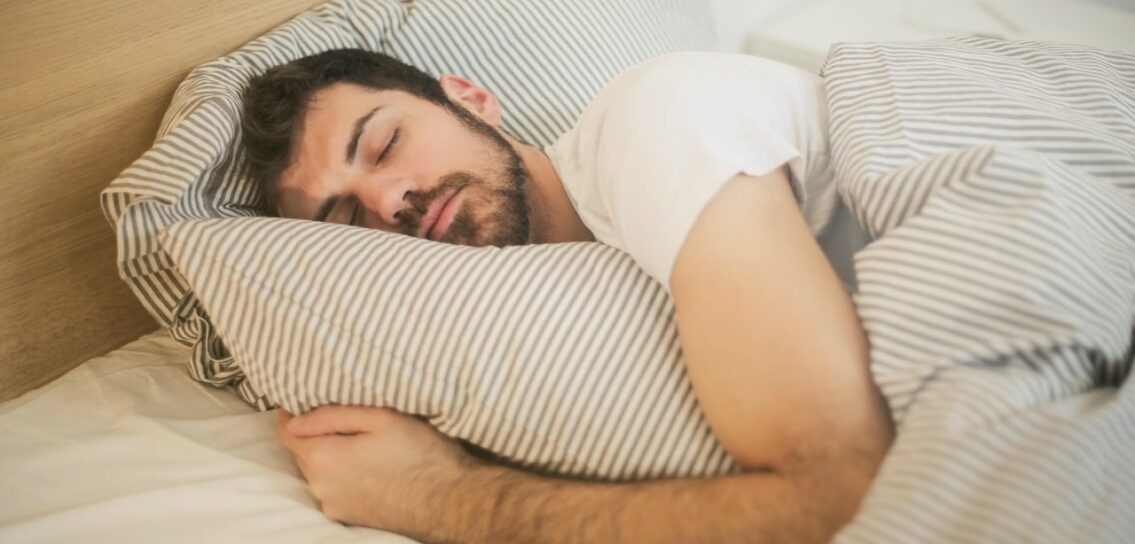Erections that happen first thing in the morning are completely normal and actually a sign of good health. The term “morning erection” is commonly used to describe erections that occur as a man is waking up.
The formal name for morning erections is nocturnal penile tumescence (NPT). The word nocturnal is used because morning erections are actually typically the last in a series of erections that occur as a man sleeps.
Men can experience morning erections at any age, but it is less and less common as age increases. This is a gradual process, meaning as a man’s hormones slowly decrease with age, so does his likelihood of having morning erections, also known as nocturnal erections.
What actually causes morning erections?
Rather than being caused by sexual arousal, nocturnal erections are caused by regular functions of the male reproductive system.
In REM sleep, the deepest sleep stage in the cycle, the body’s parasympathetic nervous system is activated. This system is responsible for rest and relaxation, opposed to the sympathetic nervous system, which is responsible for your fight or flight response. The parasympathetic nervous system is also activated during sexual arousal.
While men are in REM sleep they can experience spikes in hormones, which may be a trigger for nocturnal erections. Together, the parasympathetic nervous system, the male reproductive system, and REM sleep all affect a man’s likelihood to have nocturnal erections.
Not all men experience regular morning erections though. It’s just as normal to experience one every day as it is to experience it just once or twice a week.
What is it a sign of?
Morning erections are a positive sign indicating health in all of these areas:
Testosterone
A healthy male reproductive system isn’t complete without healthy testosterone levels. Testosterone reaches peak levels first thing in the morning, which is often enough to cause an erection even without physical stimulation. This means your morning erection is an indication that testosterone levels are healthy.
Sexual Health
Sexual health for men includes the ability to have and maintain an erection. Presence of an erection in the morning means firstly that you are capable of an erection, a sign of sexual health. A complete lack of morning erections may signify some form of erectile dysfunction.
Blood Flow
Erections are partially caused by changes in blood flow to the penis. Blood fills small chambers in the penis called erectile tissue, resulting in an erection. Healthy blood flow to and from the erectile tissue results in healthy erections.
If blood flow becomes blocked in any way, it can cause a condition called priapism, resulting in painful erections that last irregularly long and can even result in permanent damage.
Nerve Health
Erections are caused by the parasympathetic nervous system, the system in charge of your “rest and relaxation” state of your body. This is opposite to the sympathetic nervous system, responsible for your fight or flight response. Experiencing nocturnal erections or morning erections are a sign that your parasympathetic nervous system is functioning well.
When should I worry?
Having a day or two where you don’t experience a morning erection is not a major concern. However, there are a few signs that you might want to keep an eye out for. If you experience any of these, consider talking to a medical professional or urologist.
Painful erections
If your erections cause pain, you should speak with a medical professional. Some men may have a curve in their penis that causes pain during erections. This is a condition known as congenital curvature of the penis and there are multiple ways to treat it.
Painful erections or testicular pain can be symptoms of other issues as well. You don’t want to leave this undiagnosed as the issue may worsen with time.
Erections that last unusually long
Nocturnal erections typically subside after 30 minutes or a little longer. If you experience a morning erection that lasts hours, this is a symptom of priapism, and you should immediately seek emergency medical care. Priapism is a form of asphyxiation, and is caused by disruptions to healthy blood flow. It can cause permanent damage so don’t wait to visit a medical professional.
Sudden absence of morning erections
While the occasional absence is nothing to fret about, a sudden change or total absence of morning erections is enough reason to schedule a visit with your doctor or urologist. Note that men aged 60 and up typically see a gradual decrease in morning erections, so don’t be alarmed if this starts occurring for you.
Each of the previous might indicate a health issue, or even erectile dysfunction. While there isn’t a standard number of times a week a man should have morning or nocturnal erections, as each body is different, any sudden changes should be mentioned to your doctor. When you have regular exams, make sure to share how often you’re having morning erections. A medical professional will let you know if frequency is anything to worry about.
In summary
There’s no need to be embarrassed about morning erections. They’re completely normal and a sign of health in various areas of the body. The medical name for morning erections is nocturnal penile tumescence (NPT).
Your morning erection is the last in a series of nocturnal erections that occurred while you were sleeping. They’re caused by regular functioning of the male reproductive system combined with REM sleep.
You don’t need to worry about morning erections unless they are painful, last longer than normal, or suddenly stop occurring. If you experience any of these, seek a medical professional.

